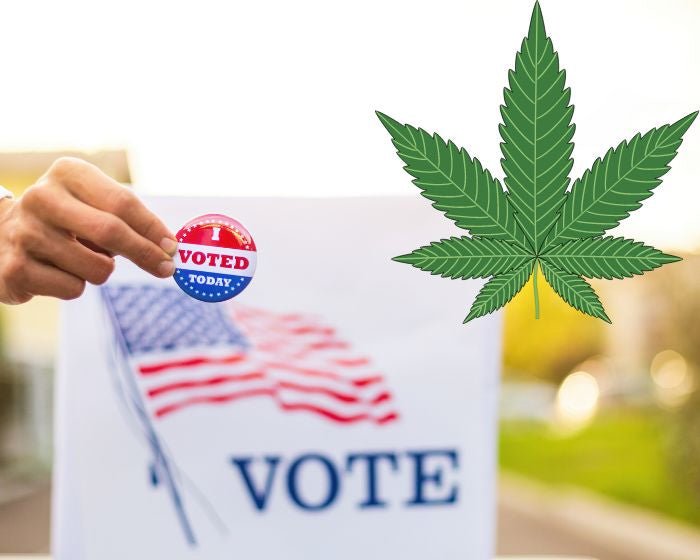One regulator’s plan to help limit the rise and influence of monopolies in the cannabis industry.

As the push for the legalization of cannabis at the federal level continues to gain more and more momentum, there is concern over the rise of potential monopolies with large corporations descending upon states newly adopting legal cannabis programs. One cannabis regulator is already raising and fervently waving a red flag concerning this growing problem already creating issues in several states.
Over the past few years, in states where marijuana is legal, large corporations have been swooping in and buying or merging with smaller businesses to effectively create oligopolies or monopolies. Understandably there is a concern that the result of these consolidations will be lower quality products and a shift of revenues away from smaller mom-and-pop businesses to out-of-state (or out-of-country) corporations.
And it’s not just through mergers and acquisitions that these companies have been usurping smaller companies and taking over market share. In addition, state regulations that allow vertical integration, where one or a few players control the entire cultivation, processing, and sale of cannabis products, have also significantly diminished competition and put the control of state and local markets in the hands of a select few corporations.
Monopolies and oligopolies have also been allowed to expand in the cannabis industry due to states ceasing to award licenses. In California, for example, oligopolies were permitted to form due to regulations passed leading up to the state’s adult-use market opening in 2018. These guidelines enabled large businesses to take advantage of a loophole and obtain as many cultivator licenses as they could afford.
According to data from Cannabiz Intelligenceâ„¢, ten public companies each hold more than 100 licenses, and some have acquired more than 200. These same ten corporations also have operations in as many as 22 states and possess licenses across the supply chain, with some reporting total quarterly revenues exceeding $300 million.
Shaleen Title, former commissioner of the Massachusetts Cannabis Control Commission and current CEO of the Parabola Center (a drug policy think tank), states, “If we wait until there already is a monopoly that’s acting like Big Tobacco, it’ll be too late. What we have to do is be intentional about preventing it in the first place.”
"If we wait until there already is a monopoly that’s acting like Big Tobacco, it’ll be too late. What we have to do is be intentional about preventing it in the first place.”
- Shaleen Title, CEO of the Parabola Center
This year, Title released a report entitled, Bigger is Not Better: Preventing Monopolies in the National Cannabis Market, which shed light on the increasing problem of monopolies in the cannabis industry. In the report, she outlines several measures that should be enacted to enhance competition in the cannabis industry if and when federal legalization happens. Her suggestions include:
- Personal Growing: This would allow individuals to grow a reasonable number of cannabis plants for personal use.
- Vertical Integration: Prohibit vertical integration that requires a business or entity to hold multiple licenses across the supply chain.
- Market Control Limits: Rather than capping the total number of licenses available, there should be a limit on how much of a market any one person or entity can control.
- State Incentives: Incentives should be created to encourage states to license small or disadvantaged businesses.
- Ownership Limits and Merger Reviews: Ownership limits should be enforced, and mergers should be reviewed based on any evidence of predatory or anticompetitive practices in state cannabis markets.
- Industry Exclusions: Any corporation that has engaged in corporate crimes, defrauded the public, or caused significant public health damage should not be allowed to enter or participate in the cannabis industry.
- Anti-monopoly Limit Enforcement: Enforce anti-monopoly limits with a special multi-agency task force.
- Interstate Commerce: Allow states to either ban or delay interstate commerce after federal legalization is enacted to ensure local businesses don’t lose their state-level advantages.
Title further contends, “If policy decisions are led by aspirational monopolists, we’re going to end up with so many mergers, and so much concentration of corporate power, that we’ll lose marijuana culture as we know it.”
"If policy decisions are led by aspirational monopolists, we’re going to end up with so many mergers, and so much concentration of corporate power, that we’ll lose marijuana culture as we know it.”
- Shaleen Title, Fmr. Commissioner of the Mass. Cannabis Control Commission
One of the hallmarks of American capitalism is the encouragement of competition within open markets. The promise that anyone can succeed with hard work and a great product or idea is what makes our envied and much duplicated economic system so inviting. But if the system becomes somehow rigged in favor of giant corporations, oligopolies or monopolies can occur, leading to the unsettling growing state of affairs in the cannabis industry.
Sean Williams of The Motley Fool warned of this exact scenario back in 2017 when he said, “As with any industry, if ‘Big Business’ can push the little guy out, they’ll have considerably more liberties down the road to raise their prices back up and capture a juicier margin, along with greater market share.”
"As with any industry, if ‘Big Business’ can push the little guy out, they’ll have considerably more liberties down the road to raise their prices back up and capture a juicier margin, along with greater market share.”
- Sean Williams, The Motley Fool
Very few will argue that reduced competition is a good thing. And the result is the same whether businesses are denied a seat due to state regulations or because large corporations have deeper pockets and can force smaller players out. Decreased competition almost always leads to higher prices, fewer product choices, and limited market growth.
The potential cannabis entrepreneur and end-user deserve to have a better and more equitable system for the seemingly inevitable legalization of cannabis at the federal level on the horizon. Let’s hope fair minds and free market spirits prevail. It’s too important of an issue and industry to have corporate greed diminish the power and benefits of this extraordinary plant.







































